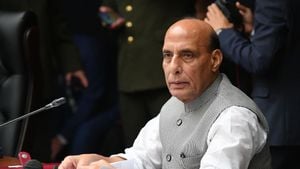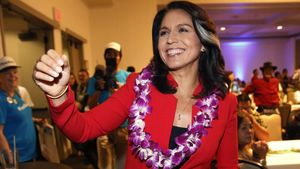The push for higher education has never felt more challenging, especially as costs continue to skyrocket beyond what many families can handle. Increasing tuition fees and living expenses have turned the once common dream of earning a degree from prestigious universities, like those listed among the most expensive schools, almost out of reach for many.<\/p>
Among these towering costs, Columbia University stands out. With total expenses averaging around $514,442 for four years, it is the highest on the list of expensive colleges, according to the analysis by Self, the financial tech company.<\/p>
Rounding out the top three are New York University and Georgetown University, with average total costs of $497,402 and $472,817, respectively. The hefty price tags at these institutions lead many to weigh the value of their education against the potential financial burdens.<\/p>
The struggle is real for middle-income families, who often find themselves stuck between qualifying for government help and managing their own financial limits. Many parents report feeling helpless as they navigate through rising expenses without the means to fully fund their child's education.<\/p>
Average living expenses alone can be quite overwhelming. Students need to cover rent, food, books, and other living costs, which can add up significantly, often exceeding initial cost estimates for tuition alone.<\/p>
Alongside housing and food, transportation costs must also be considered. Commuting can present an added financial strain, often leading to increased spending when students are less than prepared for the costs of transportation and other necessities.<\/p>
The question many face is: is it worth it? A college degree is often considered the ticket to higher earnings, yet the path toward obtaining it seems more muddled when weighed against potential student debt lasting decades.
Indeed, chasing the dream of obtaining recognized qualifications can sometimes feel like setting oneself up for financial struggles. This paradox drives home the point: getting educated is not just about knowledge, but also about money management.
Colleges across the nation, including the Massachusetts Institute of Technology and Yale University, where the costs come to averages of $441,948 and $451,516 respectively, show how competitive the education can be against earnings potential. Still, enrolling can feel like buying a ticket to debt.
Tuition financing methods such as student loans dominate conversations about funding higher education. Students need to understand the balance between accepting loans and the long-term financial responsibilities those loans bring.
The essence of true affordability lies not merely within the tuition but the wider array of living costs amplified by one's personal lifestyle and financial literacy. Financial organizations argue for planning and budgeting to help students make more informed decisions.
Many who enter careers after college have reported grappling with the associated debts—even as they work their first jobs. This struggle casts shadows on the idea of gaining immediate returns from their educational investments.
The harsh reality is, the elevated costs stir sizeable doubts among students and parents alike. This has resulted in families exploring community colleges and vocational programs as viable alternatives to cut back on expenses.
Indeed, the current financial climate has prompted many students to rethink their educational pathways and explore alternatives away from traditional four-year universities. The appeal of entering the workforce more quickly is becoming increasingly attractive for young adults.
Prospective students and families hope for continued discussions among lawmakers and educators about affordability and financing. They might find comfort among those advocating for policy changes aimed at lowering the rising costs associated with higher education.
Recent findings detail how families navigate financial aid, including loans, grants, and scholarships aimed to supplement income. With the right strategies, one can ease the financial burden, albeit the goal of achieving debt-free college remains somewhat elusive.
Higher education advocates argue it is time to prioritize making college more affordable for all students. They call for comprehensive reform, ensuring students focus on learning—not on crippling debt expectations following graduation.
Looking forward, innovation within student financing may emerge as discussions surrounding college affordability continue. There's growing recognition around the need to offer more resources to support students aiming to avoid spiraling costs.
Student loan forgiveness and various repayment programs stand out as measures many support, yet their efficacy remains debated. Many families are beginning to realize greater transparency about costs could be beneficial.
Educational institutions are increasingly encouraged to explore weighted tuition models or implement sliding scale fees based on family income. This approach could soften the blow for those slipping through the cracks of wearing education costs.
Today’s rapidly changing job market, paired with educational debt, places immense pressure on students to pick their majors wisely. This makes conversations around academic paths even more urgent and relevant, as students face uncertain futures.
On the other hand, many graduates find themselves weighing job prospects against their salaries as they wrestle with how to manage their overall financial wellbeing. The dream of achieving financial independence often clashes with the obligations incurred during university years.
Yet, for many, going to college is still viewed positively, providing valuable experiences beyond financial return. The connections made and personal growth experienced have enduring value even against the financial toll incurred.
So, the debate continues: Is the hefty investment of time and money truly reflective of the returns achieved post-graduation? Each student's experience will differ, influenced by their career paths, college choice, and personal dedication to success.
Tackling college affordability remains challenging, with families nationwide feeling the heat as costs mount. Advocacy for change remains important as discussions around education—and how it's funded—carry on.
Now, as the fall semester approaches, millions are left wondering how they will support their children's pursuits. Whether through continued sacrifices or new funding avenues, the hope is for more families to find ways to afford higher education.
The larger question looms—a once-promising dream of higher education now is muddled beneath clouds of costs and confusion. The discussion around university affordability continues as families seek clarity amid mounting concerns.
Before committing to the ever-increasing financial need of higher education, families are urged to evaluate all available options closely. Finding suitable financial strategies remains as important as ever within the current dialogue surrounding university costs.
With awareness, families can build informed paths forward, ensuring higher education remains within reach for future generations without the ever-looming burden of insurmountable debt. Advocates continue to call for significant changes to financial aid options and overall affordability, hoping to pave clearer paths for all students seeking degrees.



